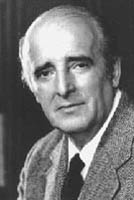Robert Laxalt
| Robert Laxalt | |
|---|---|
 |
|
| Born |
September 25, 1923 Alturas, California, United States |
| Died | March 23, 2001 (aged 77) Reno, Nevada, US |
| Nationality | American |
| Occupation | writer |
| Employer | University of Nevada, Reno |
| Spouse(s) | Joyce Nielsen Laxalt |
| Children | 3 (Bruce, Monique, and Kristin) |
Robert Laxalt (September 25, 1923 – March 23, 2001) was a Basque-American writer from Nevada.
Laxalt was born in Alturas, California, the son of Basque parents, Therese (Alpetche) and Dominique Laxalt, a shepherd, both of whom had immigrated to the United States in the early 1900s from their homeland in the Pyrenees, which straddle France and Spain.
Sweet Promised Land (1957), Laxalt's first and possibly best-known book, was based on the history of his father and his return to the homeland after forty-seven years as an immigrant sheepherder in Nevada. This book was especially well received in the ranching areas of Nevada and adjacent states, and led to creation of several "Basque Festivals" in those areas. Laxalt also served as a consultant to the Library of Congress on Basque culture, and helped start the Basque Studies program at the University of Nevada.
Robert was the younger brother of Paul Laxalt, who served as Nevada governor (1967–1971) and U.S. Senator (1974–1987). Sweet Promised Land's local popularity likely played a role in his brother Paul's early political victories.
Robert Laxalt founded the University of Nevada Press, which published almost all of his books written after 1964. This raised the prominence of the University of Nevada Press, but also limited the distribution and probably the critical attention given to Robert's books. He also served as the writer-in-residence at the University of Nevada Reno, and in 1988 became the first occupant of the Distinguished Nevada Author Chair at that university.
Laxalt was chosen along with Walter Van Tilburg Clark to be the first writer inducted into the Nevada Writers Hall of Fame when it was established in 1988 by the Friends of the University of Nevada Libraries.
From the Basque Oral History Project:
...
Wikipedia
